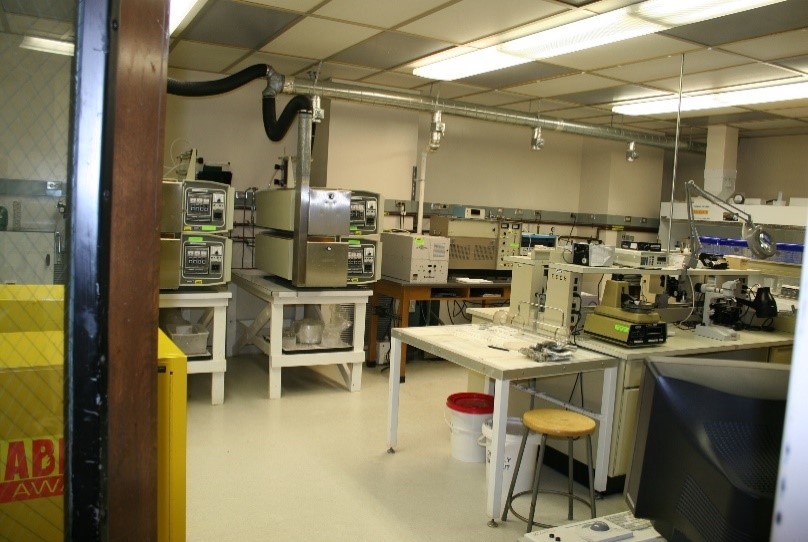Accelerated BS – MS
For more information about the BS to MS Program, please visit: https://grad.cecs.ucf.edu/bstoms/

Electrical Engineering MS & PhD
The Electrical Engineering (EE) Ph.D. program prepares students for careers in research or academia with specializations including Communications, Digital Signal Processing/Image Processing, Controls and Robotics, Electromagnetics, Electro-Optics, Photonics, Power Electronics and Electronics, and Solid-State/Microelectronics. Orlando, one of the nation’s most dynamic metropolitan areas and noted for its quality of life and vacation attractions, is the center of Florida’s I-4 High Technology Corridor. The UCF campus is adjacent to University of Central Florida Research Park, which is one of the nation’s most successful technology parks. UCF and its Research Park offer educational, research and career opportunities in a vast number of electrical engineering careers, including electronics, energy networks, power electronics, optics, lasers, solid state, microelectronics, control, communications and much more.
Research interests of the Electrical Engineering faculty include antennas, microwave and millimeter circuits/devices, communication systems, digital signal/image processing, power electronics, electronic circuits, IFF devices, electromagnetic theory, radar and microwave remote sensing, speech processing, VLSI design, spread spectrum systems, SAW and ACT devices, spectral estimation, solid state device modeling and computer-aided design (CAD) techniques, communication networks, integrated services digital networks, neural networks, systems and controls, robotics, robust control, computer control, microelectronics, semiconductors, thin films, power system stability, bipolar device modeling, solid state lasers, optical propagation, fiber optics, optical signal processing, laser-induced damage, optical testing, diffractive optics, phase conjunction, infrared detectors, Fourier optics, lens design, and nonlinear optics. The specific research that each of the faculty conduct can be found at the Department of ECE website.
Explore Further

The degree program is housed in the Harris Corporation Engineering Center: an ultra high-tech building with an abundance of new equipment, computers, and laboratories. The EE program at UCF has a long and respected history, dating back to approval to offer a Bachelor in EE degree in 1967. The Master in EE degree was approved in 1971 and the Ph.D. in EE degree began in 1983. In 2014, U.S. News and World Report ranked CpE programs at UCF as 58th out of 94 schools nationally.
While licensure or certification may be available in this field of study, our program does not directly lead to such licensure or certification upon graduation. The professional preparation you receive in our program may still assist you in such pursuits; however, we are unable to confirm the specific licensure and certification requirements of each state, territory, or foreign entity in which professional credentialing may be possible. If you intend to pursue such credentialing in your state or elsewhere, we strongly advise you to contact the applicable state credentialing authority to familiarize yourself with its specific requirements and determine if our program meets its academic criteria. Alternatively, you are welcome to contact Dr. Mingjie Lin at Milin@ucf.edu or Ms. Diana Poulalion at Diana.Poulalion@ucf.edu with questions in this regard and we will do our best to assist you in your career planning.
Application Deadlines
- Fall
- July 1
- Spring
- December 1
Ready to
get started?
Computer Engineering MS & PhD
The Computer Engineering (CpE) Ph.D. program prepares students for careers in research or academia with specializations including computer systems and reconfigurable devices, sensor networks, software engineering, intelligent systems and Machine Learning, and computer networks. The specific research that each of the faculty conduct can be found at the Department of ECE website (www.ece.ucf.edu).
Orlando, one of the nation’s most dynamic metropolitan areas and noted for its quality of life and vacation attractions, is the center of Florida’s I-4 High Technology Corridor. The UCF campus is adjacent to University of Central Florida Research Park, which is one of the nation’s most successful technology parks. UCF and its Research Park offer educational, research and career opportunities in a vast number of computer engineering careers, including simulation systems, communication networks, software engineering, avionics, telecommunications, and much more.
The CpE degree programs are housed in the Harris Corporation Engineering Center: an ultra high-tech building with an abundance of new equipment, computers, and laboratories. CpE graduate programs of study are advised by faculty specializing in all branches of Computer Engineering ranging from digital electronics to software agent systems.
CpE programs have been offered at UCF for over forty years starting in 1967 with a Bachelor in CpE degree, and the Master and Ph.D. degrees in CpE being offered at UCF since 1971 and 1983, respectively. In 2014, U.S. News and World Report ranked CpE programs at UCF as 58th out of 94 schools nationally.
Explore Further

While licensure or certification may be available in this field of study, our program does not directly lead to such licensure or certification upon graduation. The professional preparation you receive in our program may still assist you in such pursuits; however, we are unable to confirm the specific licensure and certification requirements of each state, territory, or foreign entity in which professional credentialing may be possible. If you intend to pursue such credentialing in your state or elsewhere, we strongly advise you to contact the applicable state credentialing authority to familiarize yourself with its specific requirements and determine if our program meets its academic criteria. Alternatively, you are welcome to contact Dr. Mingjie Lin at Milin@ucf.edu or Ms. Diana Poulalion at Diana.Poulalion@ucf.edu with questions in this regard and we will do our best to assist you in your career planning.
Graduate Certificates
Sustainable and Resilient Energy Systems
The Graduate Certificate in “Sustainable and Resilient Energy Systems” provides students with an interdisciplinary curriculum focused on technologies and policies for future smart energy systems that are sustainable, resilient, efficient, and market-oriented. The program prepares students for holistic design and operation challenges of emerging energy systems with distributed renewable energy sources, advanced information, communication, control and optimization technologies, along with supporting economic and management policies. This graduate certificate is beneficial to individuals (professionals, engineers and researchers) who have an interest in deployment and operation of future smart energy systems, in particular the challenges from the technology and policy perspectives.
Please visit the graduate catalog page for requirements of this certificate program.
Technologies for Smart Communities Graduate Certificate
The Graduate Certificate in Technologies for Smart Communities provides students with an interdisciplinary curriculum focused on technologies that enable smart and connected communities of the future. The program prepares students for design and operation challenges of emerging smart and connected communities, in particular from technology perspective. This graduate certificate is beneficial to individuals (professionals, engineers and computer scientists) who have an interest in deployment and operation of smart and connected communities, in particular the challenges that pertain to communications, sensing, and control technologies.
Please visit the graduate catalog page for requirements of this certificate program.

Graduate Admissions Deadlines
For information on general UCF graduate admissions requirements that apply to all prospective students, please visit the Admissions and Registration section of the Graduate Catalog. Applicants must apply online. Please be sure to submit all requested material by the established deadline(s).
PLEASE NOTE: The College of Engineering and Computer Science at UCF suggests that you fill out a pre-application form before you complete the application for graduate admission. The deadlines for the pre-application form can be found on the Prospective Student Page on the College of Engineering and Computer Science website.
UCF GRADUATE ADMISSIONS AND UCF GRADUATE ADMISSIONS COUNSELORS
E-mail: gradadmissions@ucf.edu
Phone: (407) 823-2766
Online Application
Graduate Admissions
UCF GRADUATE STUDIES MAILING ADDRESS
UCF Graduate Studies
Millican Hall 230
PO Box 160112
Orlando, FL 32816-0112
INSTITUTION CODES
GRE: 5233
GMAT: RZT (College Code: 9R)
TOEFL: 5233
APPLICATION DEADLINES
All application materials for the Masters in Electrical and Computer Engineering programs must be submitted by the appropriate deadline listed below.
Fall Priority: Jan 15
Fall: Jul 1
Spring: Dec 1
Summer: Apr 1
Fall Priority: Jan 15
Fall: Jan 15
Spring: Jul 1
Summer: Nov 1
Fall Priority: Jan 15
Fall: Mar 1
Spring: Sep 1
Summer: Dec 15
For more information, please view the Graduate Handbook.
